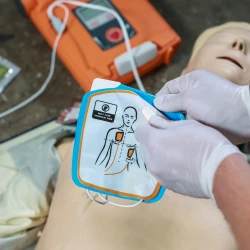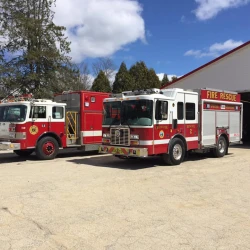Not all of us were lucky enough to always know what we wanted to be when we grew up. Even if we did, it’s likely we changed our minds or altered our career paths as we discovered new possibilities along the way.
Certainly, the COVID-19 pandemic has restructured the workforce and forced many people to reevaluate their priorities and explore new job opportunities that they might never have considered before.
If any of this sounds familiar, you might be interested in becoming an EMT in NH.
In fact, there is no time like the present as NH faces a serious EMT shortage. For that reason, American Medical Response (AMR), a large ambulance service in New Hampshire, created the “Earn While You Learn” program, which allows EMT candidates to make money while they are training.
Even better news?
Life Safety Institute is approved by the Workforce Innovation and Opportunity Act (WIOA), which means the state will assist with tuition for any candidates who are under or unemployed and interested in our EMT program.
We are proud to be NH’s first and only WIOA approved program.
We also offer financing for courses completed at any of our NH locations -- Canaan, Colebrook, Concord, and Hampton!
Ready to get started?
The following will explain how to become a NH EMT and why this is a job worth pursuing, perhaps now more than ever before.
Life Safety Institute is standing by to provide expert Emergency Medical Technician (EMT) Training, for those of you considering a new career and the chance to “Earn While You Learn!”
At Life Safety, we believe that everyone can save a life and offer training from CPR to Advanced Life Support and EMT Training.
Check out all of our Course Offerings here to learn more!
Interested in becoming an EMT candidate?
Read on for steps to successfully become an EMT in NH!
What is an Emergency Medical Technician (EMT)?
An Emergency Medical Technician, or EMT, is a healthcare professional who provides out-of-hospital emergency care and transportation for critical and emergent patients.
EMTs are the first point of contact for many people who need urgent medical attention, and they play a vital role in the comprehensive emergency medical services (EMS) system.
EMTs have the basic knowledge and skills necessary to stabilize and safely transport patients in a variety of settings, from routine medical transports to life-threatening emergencies. They work under physician oversight as part of a coordinated EMS response system.
If you need emergency medical assistance, an EMT is one of the best people to help you. They have the training and experience to provide prompt, effective treatment for a wide range of medical emergencies. So if you or someone you know needs urgent medical care, don't hesitate to call 911 - an EMT will be on their way!
EMTs provide vital care to patients in need, and they are an essential part of the emergency medical services system.
If you're interested in becoming an EMT, we offer a flexible and convenient three month program. So if you want to help save lives and make a difference in your community, consider becoming an Emergency Medical Technician!
Emergency Medical Technicians have the basic knowledge and skills necessary to stabilize and safely transport patients in a variety of settings, from routine medical transports to life-threatening emergencies. They work under medical oversight as part of a coordinated EMS response system.
EMTs provide vital care to patients in need, and they are an essential part of the emergency medical services system.
If you're interested in becoming an EMT, there are a variety of training programs available. So if you want to help save lives and make a difference in your community, consider becoming an Emergency Medical Technician!
Do you have any questions about what it takes to become an EMT or the role EMTs play in the healthcare system?
Contact us with your questions today!
What do Emergency Medical Technicians (EMTs) do?
Given what you’ve just read above, an EMT certainly sounds like an important position -- and it is!
Still, you might be wondering… what exactly do Emergency Medical Technicians (EMTs) do? What tasks will I be responsible for and how much medical training do I need?
If any of you are harkening back to lousy grades in high school science classes, don’t sweat it! EMT training is specific and accessible to anyone willing to learn and pay attention to detail.
On that note, a typical day in the life of an EMT is, well… not typical.
As an EMT, every day is different. You never know what kind of emergencies you'll be responding to. Every day is different because every call is a new call. Every person has a different problem.
However, there is one constant that you must embrace in order to be a successful EMT:
You are the first line of defense in any medical emergency.
From checking in at the base to ensuring the ambulance is stocked and ready to go, you must always be prepared for anything.
When 911 calls come in, you're the one who answers them. So it's important to know what an EMT does on a daily basis.
Let’s start with the basics…
Basic Daily Responsibilities of a NH EMT
An EMT is a medical professional who provides emergency care to patients. They're often the first responders on the scene of an accident or medical emergency. As such, they play a critical role in ensuring that patients receive the necessary treatment and care.
An EMT's day typically starts with checking in at the base. This is where they ensure that the ambulance is stocked and ready to go.
From there, it's go time!
EMTs are dispatched to various emergencies as needed through their shift.
In most cases, an EMT's day consists of responding to 911 calls and providing emergency care to patients. However, an EMT may also be called upon to provide patient transport, administer medical care in the field, or assist with other medical professionals.
For these reasons, an EMT always has to be ready for anything, which is why they are constantly training and learning new skills so that they can be the best possible caregivers for their patients.
In an emergency situation, that knowledge and experience can mean the difference between life and death.
What Can I Do with My Emergency Medical Technician (EMT) Training?
What can’t you do, might be a better question. One of the perks of successfully completing your Emergency Medical Technician (EMT) training is that you position yourself to apply for a range of important roles -- all of which rely on your EMT skills.
Firefighter
Getting back to what you wanted to be when you were a kid, a firefighter featured as a dream job for many of us.
Good news!
With your EMT training, becoming a firefighter is an obvious and popular path.
As a firefighter, you will respond to emergency medical calls as well as fire emergencies. Additionally, firefighters are also frequently involved in public education, such as teaching people how to escape a fire.
Many fire departments in New Hampshire require both EMT and Firefighter certifications.
There are several steps to become a firefighter:
-
Emergency Medical Technician certification
-
Pass your CPAT test
-
Apply for jobs with local fire departments or EMS agencies
-
Interview with the hiring department and (if selected), complete written exams (for some positions)
-
Pass background checks and drug screenings
-
Complete physical fitness tests, such as climbing ladders or carrying equipment up flights of stairs while wearing full gear
-
Get officially sworn in as a firefighter
For a complete list of jobs with fire departments throughout NH, check the NH Fire Academy & EMS Statewide Employment Opportunities.
Hospital or Medical Office
Many EMTs also find employment in a hospital or medical office setting. In these environments, they usually provide patient care and patient assessments. These are not necessarily emergencies, though they can be. In this case, you would need to have a high degree of skill and knowledge when it comes to evaluating and addressing a patient's needs.
Ambulance Service / EMS Agency
Many EMTs pursue positions with an ambulance service or EMS agency. These jobs can be very demanding, but they also offer a great deal of variety. You may find yourself responding to emergency calls, providing patient care, doing assessments, and transporting patients from one facility to another.
First Aid Station or Ski Patrol
Many first aid stations and ski patrols employ EMTs. These organizations provide first aid and/or medical care to people who are injured while participating in outdoor activities. This can be a very rewarding career, especially if you enjoy outdoor activities.
Additional EMT Career Options
There are many other positions where EMTs can find employment, including jobs with police departments, correctional facilities, schools, and private companies.
Some people even pursue their EMT simply as an extra gold star on their resume, or if they want to volunteer with their local fire department, spend their summers as a lifeguard, or work in childcare.
The important thing is to consider why you want to become an EMT and then explore all of your options!
Review all NH EMT Statewide Employment Opportunities.
How Do I Become an Emergency Medical Technician (EMT) in New Hampshire?
For many, becoming an Emergency Medical Technician (EMT) in New Hampshire is the first step towards a new career in service to others. Few other career paths enable you to make such an impact.
The decision to become and EMT in NH is a personal one, but the steps are the same for everyone and generally include the following:
-
Make the decision to pursue your EMT training
-
Enroll in a EMT program
-
Get Nationally Certified
-
Get State Certified/Licensed
-
Officially embark on your new career as an EMT!
Let’s explore these steps in greater detail…
Step One: Make the Decision to Become an EMT
Sure, this first step is a bit of a cliche, but it’s important. Only you know if becoming an EMT is right for you. Take your time and a personal inventory of your career goals -- consider what you’re good at, what you like to do, what really motivates you to get up in the morning and get your day going.
Let’s be honest, nobody wants to waste their time in class to realize they hate it.
That said, getting your EMT is one of those things that’s relatively simple, not financially burdensome, and opens so many doors that it’s almost always a good idea to pursue it and then figure out what you want to do after you’ve completed the training!
Step Two: Enroll in an EMT Program
EMT programs are designed to help you succeed.
If you meet the entry requirements, show up, and do the work you will become an EMT. Most EMT programs, like those offered at Life Safety Institute, meet the national standard and result in national certification.
What are the EMT entry requirements?
Most programs have very few entry requirements - in fact, you don’t even need to be 18 anymore!
Simply find a program that matches your schedule and sign up!
Once enrolled, it’s all about showing up for class, reading the book, and completing all your assignments. If you’re taking a NH EMT program you will also need to complete some clinical time.
For example, our program requires you to perform ten patient assessments in a clinical setting.
At the end of the program you will take a final written exam and a final practical exam. If you’ve made it this far you’re basically ready to go, but you have a few more things to accomplish.
Step Three: Get Nationally Certified
This step requires you to successfully complete your EMT program and submit an application fee to the National Registry of Emergency Medical Technicians (NREMT) in order to apply for your EMT certification.
You will be required to sit for a written Cognitive Based Test CBT - this is commonly referred to as the written exam/test.
You will also need to take and pass a psychomotor examination, which is commonly called the practical.
Don’t panic -- a good EMT program will ensure that you are over prepared for both of these assessments and will support you through them.
Once you’ve paid your fee and taken both the written and practical you’ll become a nationally credentialed EMT!
Step Four: Get State Certified/Licensed
Finally, all you have to do is take your national card to the state in order to apply for your state license. In New Hampshire, this is a simple process.
You will have to complete a background check with fingerprints, submit an application, and provide a copy of your national certification.
The state has a good article on this.
Step Five: Embark on Your New Career as an EMT!
Congratulations, you did it!
The entire EMT certification process takes between four to six months, but it’s well worth it in the end, as you’ll soon discover!
Sign up for Life Safety Institute’s EMT Training course today!




